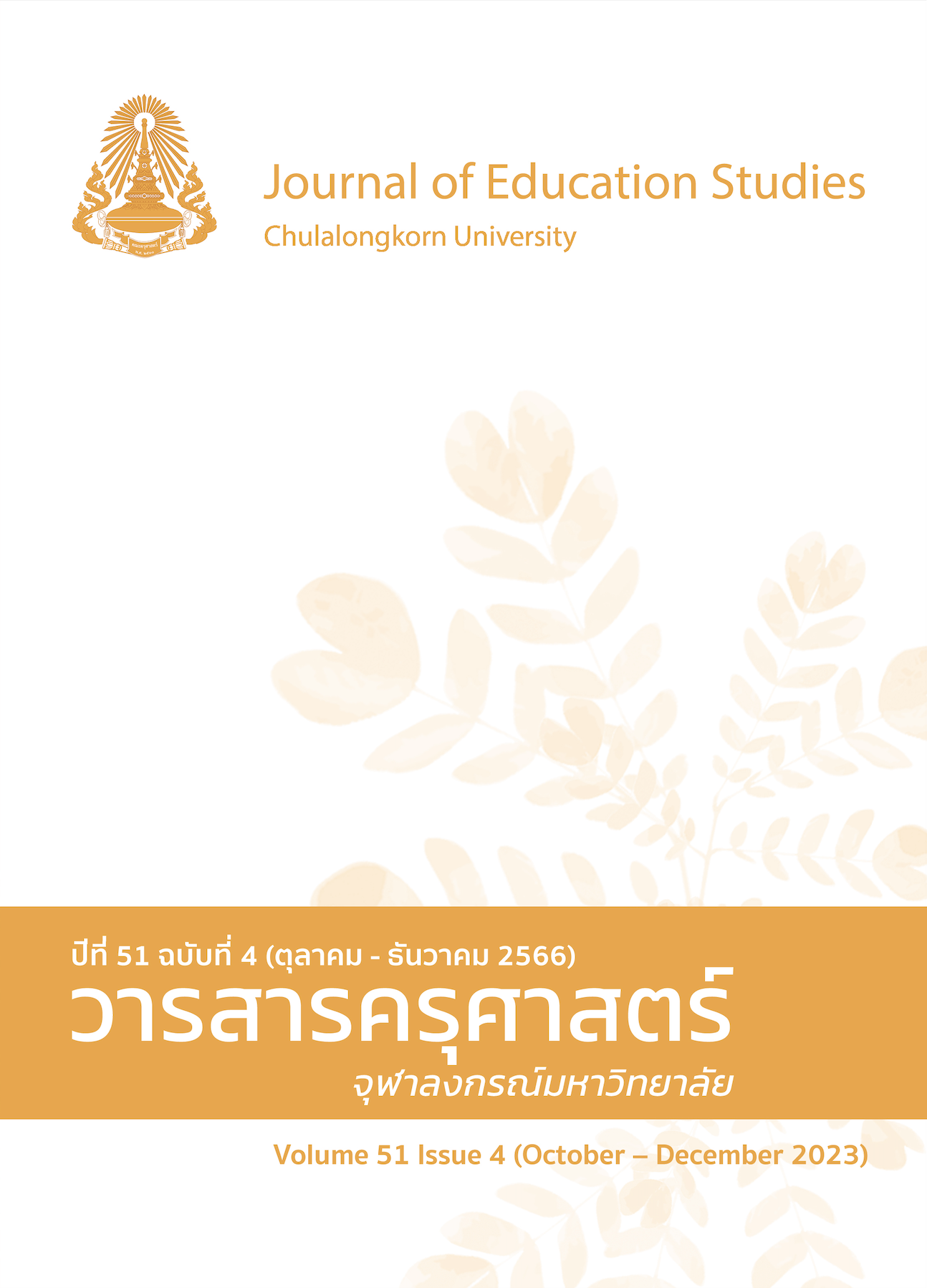Developing Learning Activities Using an Open Approach Together with Assessment for Learning to Promote Mathematical Competencies of Ninth Grade Students
DOI:
https://doi.org/10.14456/educu.2023.37Keywords:
Open Approach, Assessment for Learning, Mathematical CompetenciesAbstract
The objectives of this research were to: 1) create and determine the effectiveness, 2) study the experimental results, and 3) examine opinions towards learning activities using an open approach together with assessment for learning to enhance the mathematical competencies of ninth grade students. The research process involved three stages: First, creation and effectiveness stage, which involved six learning activity plans, mathematical competencies test, which involved three situations, and analytic rubrics scoring. Second, trial stage, the research participants included 11 ninth grade students. The research instrument was an open-ended questionnaire was used in the third stage, studying opinion. The research findings indicate that: 1) the learning activities were found to be appropriate at the highest level (M = 4.64, SD = 0.45), as the effectiveness index for all competencies was greater than 0.5; 2) students demonstrated higher performance in all three phases:
Phase 1 - capacity building, Phase 2 – proficiency development, and Phase 3 – competencies building, as the post-learning result was significantly higher than before the experiment at the .05 level of significance and was rated at an excellent level; and 3) the opinions toward the learning activities revealed the students had intrinsic motivation, learning teamwork, learning strategies,
self-improvement, basic knowledge, and attitudes toward learning new things.
References
ภาษาไทย
กษมา เกิดประสงค์. (2560). การพัฒนารูปแบบการจัดการเรียนรู้เสริมสร้างสมรรถนะทางคณิตศาสตร์ของ
นักเรียนชั้นมัธยมศึกษาปีที่ 1. Veridian E-Journal, Silpakorn University, 10(3), 2121-2137.
กฤษฎา ขุนอาจ. (2560). ผลการจัดการเรียนรู้โดยใช้วิธีการแบบเปิดร่วมกับรูปแบบ SSCS ที่มีต่อความสามารถในการแก้ปัญหาและความสามารถในการเชื่อมโยงทางคณิตศาสตร์ของนักเรียนชั้นมัธยมศึกษาปีที่ 2 (วิทยานิพนธ์การศึกษามหาบัณฑิต). ชลบุรี: มหาวิทยาลัยบูรพา.
กิติศักดิ์ ดีพื้น. (2561). สมรรถนะทางคณิตศาสตร์ที่สอดคล้องกับนโยบายประเทศไทย 4.0 ของนักเรียนชั้น
มัธยมศึกษาปีที่ 3 สังกัดสำนักงานเขตพื้นที่การศึกษามัธยมศึกษา เขต 8 (ดุษฎีนิพนธ์ปรัชญาดุษฎีบัณฑิต). ชลบุรี: มหาวิทยาลัยบูรพา.
คัมภีรภาพ คงสำรวจ, ชนาธิป ศรีโท, แก่นเพชร แฝงสีพล, ธนกร ชูสุขเสริม และวิทูล ทาชา. (2565).
กลยุทธ์การจัดการเรียนรู้ด้วยตนเองหลังยุคโรคอุบัติใหม่ด้วยโซเชียลมีเดีย. Journal of Buddhistic Sociology, 7(3), 142-154.
พิมพันธ์ เดชะคุปต์ พเยาว์ ยินดีสุข และพรเทพ จันทราอุกฤษฎ์. (2566). การเรียนรู้เชิงรุกเสริมสร้างสมรรถนะ. กรุงเทพฯ : จุฬาลงกรณ์มหาวิทยาลัย.
สกลรัชต์ แก้วดี. (2561). การพัฒนาผู้เรียนด้วยการประเมินเพื่อการเรียนรู้. วารสารครุศาสตร์ จุฬาลงกรณ์มหาวิทยาลัย, 46(2), 394-409.
สถาบันส่งเสริมการสอนวิทยาศาสตร์และเทคโนโลยี. (24 มิถุนายน 2565). PISA 2022 กับการประเมินความฉลาด
รู้ด้านคณิตศาสตร์. PISA Thailand. https://pisathailand.ipst.ac.th/infographics-pisa2022-math-framework/.
สรัญญา จันทร์ชูสกุล. (2561). แนวคิด หลักการ และยุทธวิธีการประเมินเพื่อการเรียนรู้. วารสารการวัดผลการศึกษา มหาวิทยาลัยมหาสารคาม, 24(1), 14-28.
สุชีรา จันครา บุญเรียง ขจรศิลป์ และชานนท์ จันทรา. (2561). การพัฒนาทักษะการคิดวิเคราะห์โดยใช้กระบวนการ GPAS และการประเมินเพื่อการเรียนรู้ในรายวิชาพื้นฐานคณิตศาสตร์ของนักเรียนชั้นประถมศึกษาปีที่ 6 โรงเรียนวัดดอนเมือง (ทหารอากาศอุทิศ) สังกัดกรุงเทพมหานคร. วารสารศึกษาศาสตร์ มหาวิทยาลัยนเรศวร, 20(1), 196-210.
สุดาพร ติ๊บปาละ. (2563). ผลการใช้รูปแบบการสอนโดยใช้วิธีการแบบเปิดร่วมกับการฝึกเชิงพุทธิปัญญาที่ส่งผล
ต่อผลการเรียนรู้คณิตศาสตร์และการคิดวิเคราะห์ (การศึกษาค้นคว้าด้วยตนเองการศึกษามหาบัณฑิต).
พะเยา: มหาวิทยาลัยพะเยา.
สดใส ศรีกุตา. (2557). การใช้การประเมินระหว่างสอนของครูเพื่อปรับการจัดการเรียนรู้ในชั้นเรียนที่ใช้การศึกษา
ชั้นเรียนและวิธีการแบบเปิด (วิทยานิพนธ์ปริญญาศึกษาศาสตรมหาบัณฑิต). ขอนแก่น:
มหาวิทยาลัยขอนแก่น.
หนึ่งฤทัย มะลาไวย์, อรพินทร์ ชูชม และนริสรา พึ่งโพธิ์สภ. (2565). การทำงานเป็นทีมของนักเรียน: ปัจจัยเชิง
สาเหตุ ข้อเสนอแนะในการวิจัย. Journal of Roi Kaensarn Academi, 7(3), 425-438.
อนุวัติ คูณแก้ว. (2565). การทดสอบ การวัดผล และประเมินผลการศึกษาแนวใหม่. กรุงเทพฯ:
จุฬาลงกรณ์มหาวิทยาลัย.
อัครพล พรมตรุษ. (2565). การพัฒนาความเข้าใจมโนทัศน์ทางคณิตศาสตร์ของนักเรียนชั้นมัธยมศึกษาปีที่ 1 โดยใช้วิธีการแบบเปิด: การวิจัยเชิงปฏิบัติการในชั้นเรียน. ศึกษาศาสตร์สารมหาวิทยาลัยเชียงใหม่,6(2),61-75.
อันนา วงศ์พัฒนกิจ. (2565). การศึกษาผลสัมฤทธิ์ทางการเรียนคณิตศาสตร์และความสามารถในการแก้ปัญหาทางคณิตศาสตร์ เรื่อง หลักการนับเบื้องต้นสำหรับนักเรียนชั้นมัธยมศึกษาปีที่ 5 โดยใช้วิธีการสอนแบบเปิดร่วมกับการใช้คำถามระดับสูง (วิทยานิพนธ์วิทยาศาสตรมหาบัณฑิต).
ชลบุรี: มหาวิทยาลัยบูรพา.
อัมพร ม้าคนอง. (2553). ทักษะและกระบวนการทางคณิตศาสตร์: การพัฒนาเพื่อพัฒนาการ. กรุงเทพฯ:
จุฬาลงกรณ์มหาวิทยาลัย.
ภาษาอังกฤษ
Inprasitha, M. (2010). “One Feature of Adaptive Lesson Study in Thailand-Designing Unit”.
In C. S. Cho, S. G. Lee, & Y. H. Choe (Eds.), Proceeding of the 45th Korean National
Meeting of Mathematics Education(pp.193-206). Korea: Dongkook University, Gyeongju.
Niss, M., & Højgaard, T. (2019). Mathematical competencies revisited. Educational Studies in
Math-ematics, 102(1), 9–28. https://doi.org/10.1007/s10649-019-09903-9
Niss, M. & Jensen, T. H. (2002). Competencies, Skills, and Assessment. The Ministry of
Education, Copenhagen Denmark.
Steen, L.A. (2001). Mathematics and democracy: The case for quantitative literacy. Princeton, NJ: National Council on Education and the Disciplines.
Sun, L., & Xiao, L. (2023). An SEM Model of Learning Engagement and Basic Mathematical
Competencies Based on Experiential Learning. Applied Sciences, 13(6), 3650.
Organization for Economic Cooperation and Development (OECD). (2009). Measuring Student
Knowledge and Skills –A new Framework for Assessment. OECD PUBLICATION: France.
. (2019), “PISA 2018 Mathematics Framework”, in PISA 2018 Assessment and Analytical
Framework, OECD Publishing, Paris. DOI: https://doi.org/10.1787/13c8a22c-en.
Patamavipat, S. (2014). Assessment of mathematical literacy of PISA 2015. IPST Magazine,
(188), 35-39. [in Thai]
Downloads
Published
How to Cite
Issue
Section
License

This work is licensed under a Creative Commons Attribution-NonCommercial-NoDerivatives 4.0 International License.




